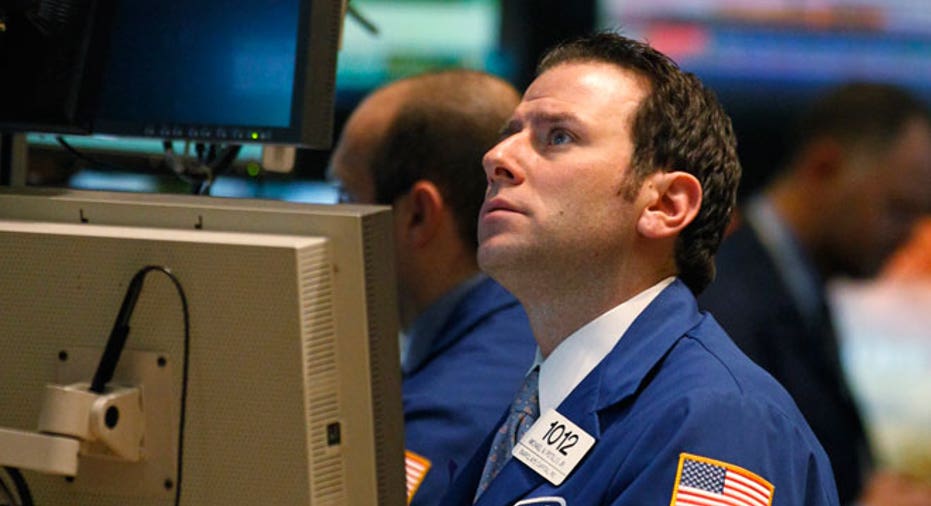Wall Street Kicks Off 2012 With Weekly Gain, But Euro Anxiety Persists

FOX Business: The Power to Prosper
The markets kicked off 2012 in a cheery mood, rallying more than 1% this week as traders reacted to an abundance of positive data on the economy, but European woes stilled weighed heavily on traders' sentiment.
Today's Markets
The Dow Jones Industrial Average fell 55.8 points, or 0.45%, to 12360, the S&P 500 dipped 3.3 points, or 0.25%, to 1278 and the Nasdaq Composite rose 4.4 points, or 0.16%, to 2674.
Despite Friday's weak performance, the Dow climbed 1.2% for the week, the S&P 500 jumped 1.6% and the Nasdaq zoomed 2.7% higher.
Out of the major sectors, materials and financial shares had the strongest week by a wide margin. Bank of America (NYSE:BAC), the nation's second largest bank by assets, has zoomed more than 10% during the first week of the year, a stark contrast from the pounding it took last year, while its larger rival JPMorgan Chase (NYSE:JPM) posted a solid advance as well.
Several big-name technology companies, like Microsoft (NASDAQ:INTC), Intel (NASDAQ:INTC) and Apple (NASDAQ:AAPL), rallied as well, helping the Nasdaq post the strongest performance of the major market averages.
Telecommunications players like Verizon Communications (NYSE:VZ) and utilities such as Consolidated Edison (NYSE:ED) have had a shaky start to the year.
A round of strong data has been one of the key's to the new year's rally, analysts have said. The monthly employment report, one of the most closely tracked pieces of economic data, acts as a good case in point for the broader trend.
The economy tacked on 200,000 jobs in December as the unemployment rate nudged lower to 8.5% from a revised 8.7% in November, according to a report from the Labor Department. The jobless rate is now at its lowest level since February 2009. In the past year, the economy has added 1.6 million jobs, the report said.
Economists had forecast a smaller gain of 150,000 jobs coupled with a slight increase in the unemployment rate to 8.7% from an initial 8.6%. Digging into the data, the private sector added 212,000 jobs, while the government shed 12,000 in what has been a trend as the government has pared back spending.
The size of the labor force, those who are employed or actively seeking employment, did, however, narrow by 50,000 individuals. As the unemployment rate is calculated using the labor force numbers and not the total population, the decrease in that reading partly contributed to the falling unemployment rate.
"There is no question that today’s employment report is a positive and there is also no question that the pace of job growth has accelerated of late," Dan Greenhaus, chief global strategist at BTIG wrote in an e-mail. However, Greenhaus says the slow rate of economic growth will mean it is "going to take years" before employment comes back to pre-financial crisis levels.
The unemployment rate has moderated significantly since hitting 10.1% in October 2010, but the situation has improved at a slow pace. This has prompted action from the U.S. government to boost jobs and an ongoing effort from the Federal Reserve to accelerate economic growth.
Other data released earlier this week have shown the jobs market has continued improving markedly in December as well. Indeed, payroll processor ADP said private-sector employment increased at the swiftest pace in December since it began reporting its data in 2001. The number of individuals applying for unemployment benefits every week has been trending lower as well, in what economists have said is a positive sign about the beleaguered market.
Still, traders remain wary about the still fragile situation in Europe. Italy's borrowing costs continued rising on bond markets on Thursday, meaning the euro zone's third-biggest economic player may struggle to borrow on the private market and finance itself this year. The country's 10-year note recently yielded 7.16%, a level that is seen as unsustainable by many analysts.
Fitch Ratings also slashed Hungary's credit rating by one notch to "BB+" from "BBB-" and warned of the potential for more cuts down the line. Fitch is now in line with Standard & Poor's and Moody's Investor Service, both of whom have the country in junk territory.
The recent enthusiasm over the positive U.S. data may be "tempered with the familiar worries about Europe moving back to the fore in recent days, with some taking the view that the payrolls result is only going to provide a slight diversion of attention before caution returns," Yusuf Heusen, a London-based trader at IG Index wrote in an e-mail.
Meanwhile, the euro has struggled, recently hitting the lowest level since September 2010 in a sign of market worries about the currency bloc. The single currency recently fell 0.57% to $1.2716, while the U.S. dollar rose 0.46% against a basket of six world currencies.
Energy markets were mixed. The benchmark crude oil contract traded in New York dipped 25 cents, or 0.25%, to $101.56 a barrel. Wholesale RBOB gasoline gained 0.01% to $2.752 a gallon.
Gold dipped $3.30, or 0.2%, to $1,616 a troy ounce. Silver was down 2.1% to $28.65 a troy ounce. U.S. Treasury bond prices rose, pushing yields lower. The benchmark 10-year note yields 1.965% from 1.995%.
Foreign Markets
European blue chips slid 0.74%, the English FTSE 100 gained 0.45% to 5,650 and the German DAX dipped by 0.62% to 6,058.
In Asia, the Japanese Nikkei 225 slumped 1.2% to 8,489 and the Chinese Hang Seng sold off by 1.2% to 18,593.



















